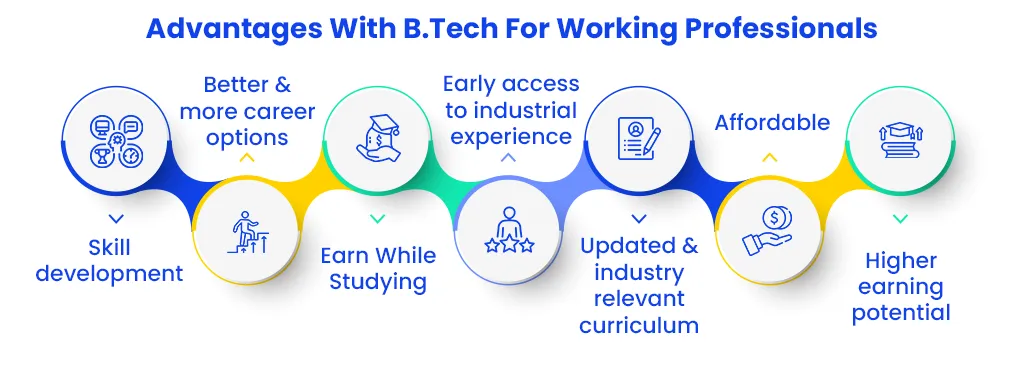
Overview
When students are in high school, their path to success is often an evolving journey, filled with choices and opportunities. If you have completed your B.Sc. degree and find yourself confused about the next step in your academic pursuit, the idea of pursuing a B.Tech degree might have crossed your mind. B.Tech course opens a world of possibilities and bridges the gap between theory and application.
In this blog, we will embark on a captivating exploration of the reasons why pursuing a B.Tech after a B.Sc. can be a transformative choice.
Why B.Tech is the best choice after B.Sc?
A B.Tech course after a B.Sc course is the best choice for many reasons. Give below are a few reasons why it is the best:
Career Opportunities: B.Tech graduates often have a wider range of career opportunities compared to B.Sc graduates. Engineering disciplines such as B.Tech in computer science, B.Tech in electrical engineering, B.Tech in mechanical engineering, B.Tech in civil engineering, and others offer diverse career paths in industries like technology, manufacturing, construction, energy, telecommunications, and more.
Practical Application: B.Tech programs typically focus on the practical application of scientific principles and theories. While a B.Sc degree provides a solid theoretical foundation, a B.Tech program will help you in developing hands-on skills and technical knowledge that are highly valued in the industry. This practical approach can make you more job-ready and increase your employability.
Industry Relevance: B.Tech degrees are often designed to meet the demands of specific industries and sectors. This means that upon graduation, you will have a better understanding of industry practices, technologies, and trends, making it easier to transition into a relevant job role.
Engineering Skills: B.Tech programs typically focus on developing engineering skills, such as problem-solving, critical thinking, analytical abilities, and technical proficiency. These skills are highly in demand across various industries.
Professional Accreditation: Many B.Tech programs are accredited by professional bodies and organisations, which adds credibility and recognition to your degree. It may also provide you with opportunities for professional networking, internships, and access to industry events.
Eligibility criteria for B.Tech after B.Sc
- Students must have completed their 12th standard with a minimum of 50% from the science stream (physics + chemistry + maths).
- They should have also completed their B.Sc degree with a minimum of 45% from a recognised university.
Benefits of choosing B.Tech after B.Sc
Specialised Technical Knowledge: B.Tech courses provide specialised technical knowledge in a specific field of engineering. By going from a B.Sc to a B.Tech, you can have a deeper understanding of a particular area of interest and gain expertise in that domain.
Enhanced Employability: Combining a B.Sc with a B.Tech can make you a highly competitive candidate in the job market. Employers often value candidates with diverse educational backgrounds who can bring a multidisciplinary perspective to their work. Your combined knowledge of scientific principles and engineering skills can make you stand out among other applicants and increase your chances of securing desirable job positions.
Interdisciplinary Projects and Collaborations: With a combined B.Sc and B.Tech background, you can contribute effectively to interdisciplinary projects and collaborations. Many industries and research fields require professionals who can bridge the gap between scientific research and practical engineering applications.
Higher Earning Potential: B.Tech graduates often enjoy higher earning potential compared to B.Sc graduates. Engineering roles are often in high demand, and the specialised technical skills acquired during a B.Tech program are highly valued by employers.
Professional Networking: Pursuing a B.Tech degree exposes you to a network of professionals, faculty, and fellow students in the engineering field. This network can provide valuable connections, mentorship opportunities, and industry insights.
Job Scope after B.Tech
After completing a B.Tech degree following a B.Sc degree, you can benefit from a diverse range of career opportunities that combine both scientific and engineering knowledge. Here are some potential job scopes:
| Job scopes | Description |
| Research and Development (R&D) | This involves working on innovative projects, designing experiments, analysing data, and developing new products or technologies. |
| Technical Consultancy | You can provide expert advice, solutions, and recommendations to clients or organisations in areas that require both scientific and engineering perspectives. |
| Data Analysis and Modeling | This involves analysing complex scientific and engineering data and building mathematical models for predictions and simulations. |
| Environmental and Sustainability Engineering | There is an increasing demand for professionals who can integrate scientific understanding with engineering solutions. You can contribute to areas like renewable energy, waste management, environmental impact assessment, and sustainable development. |
| Biomedical Engineering | If your B.Sc specialisation was in a biological or life science field, and you pursued a B.Tech in biomedical engineering, you can work at the intersection of science and engineering in the healthcare industry. |
| Technological Innovation and Entrepreneurship | Your combined knowledge can be helpful in pursuing entrepreneurial ventures or contributing to technological innovation |
Conclusion
Pursuing a B.Tech after B.Sc. opens doors to higher education opportunities. By combining the analytical and scientific thinking developed during your B.Sc. with the technical expertise gained through a B.Tech program, you position yourself for a fulfilling and successful career that aligns with your passions and interests.
Advance your career with Sunstone while studying at the top B.Tech colleges. At Sunstone students can learn occupational skills with the help of training courses. It also provides placement assistance and interview guarantees to its students, which can help secure job offers.
FAQ:
Can we do B.Sc after B.Tech?
Yes, you can pursue a B.Sc degree after a B.Tech degree.
How long is a B.Tech degree after the B.Sc program?
In general, a B.Tech degree is of four years, but if you are pursuing a B.tech course after a B.Sc course then the duration of a B.tech degree might reduce.
Can I do B.Sc and B.Tech?
Yes, it is possible to pursue both a B.Sc and a B.Tech degree.
